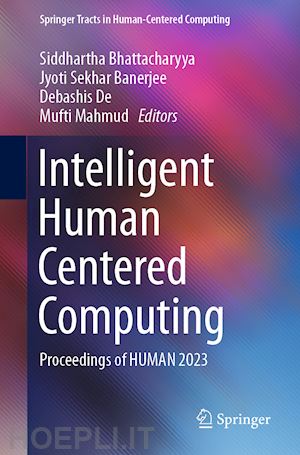
Questo prodotto usufruisce delle SPEDIZIONI GRATIS
selezionando l'opzione Corriere Veloce in fase di ordine.
Pagabile anche con Carta della cultura giovani e del merito, 18App Bonus Cultura e Carta del Docente
This book features high-quality research papers presented at the First Doctoral Symposium on Human Centered Computing (HUMAN 2023), jointly organized by Computer Society of India, Kolkata Chapter and Techno India University, West Bengal, on February 25, 2023. This book discusses the topics of modern human centered computing and its applications. The book showcases the fusion of human sciences (social and cognitive) with computer science (human–computer interaction, signal processing, machine learning, and ubiquitous computing).
Dr. Siddhartha Bhattacharyya [FRSA, FIET (UK), FIEI, FIETE, LFOSI, SMIEEE, SMACM, SMAAIA, SMIETI, LMCSI, LMISTE] is currently the principal of Rajnagar Mahavidyalaya, Birbhum, India. Prior to this, he was a professor at CHRIST (Deemed to be University), Bangalore, India. He also served as the principal of RCC Institute of Information Technology, Kolkata, India. He has served VSB Technical University of Ostrava, Czech Republic, as a senior research scientist. He is the recipient of several coveted national and international awards. He received the Honorary Doctorate Award (D. Litt.) from the University of South America and the SEARCC International Digital Award ICT Educator of the Year in 2017. He is a co-author of 6 books and the co-editor of 94 books and has more than 400 research publications in international journals and conference proceedings to his credit.
Dr. Jyoti Sekhar Banerjee is currently serving as the head of the Department in the Computer Science and Engineering (AI & ML) Department at the Bengal Institute of Technology, Kolkata, India. Additionally, He is also the professor-in-charge, R & D and Consultancy Cell & Nodal Officer of the IPR Cell of BIT. Dr. Banerjee did his Post-Doctoral Fellowship at Nottingham Trent University, UK, in the Department of Computer Science. He also completed the postgraduate diploma in IPR & TBM from MAKAUT, WB. He has teaching and research experience spanning 18 years and completed one IEI funded project. He is the lead author of “A Text Book on Mastering Digital Electronics: Principle, Devices, and Applications” and co-editor of the six books. He has also co-authored another book and is currently processing three edited books in reputed international publishers like Springer, CRC Press, De Gruyter, etc.
Debashis De is a professor in the Department of Computer Science and Engineering at the Maulana Abul Kalam Azad University of Technology, West Bengal, India. He received M.Tech. from the University of Calcutta, in 2002. and a Ph.D. from Jadavpur University in 2005. He is a senior member-IEEE, fellow IETE, and life member CSI. He was awarded the prestigious Boyscast Fellowship by the Department of Science and Technology, Government of India, to work at the Heriot-Watt University, Scotland, UK. He received the Endeavour Fellowship Award from 2008–2009 by DEST Australia to work at the University of Western Australia. He received the Young Scientist award both in 2005 in New Delhi and in 2011 in Istanbul, Turkey, from the International Union of Radio Science, Belgium. In 2016, he received the JC Bose research award from IETE, New Delhi.Dr. Mufti Mahmud is an associate professor of Cognitive Computing at the Computer Science Department of Nottingham Trent University (NTU), UK. He has been the recipient of the top 2% cited scientists worldwide in computer science (2020, 2021), the NTU VC outstanding research award 2021, and the Marie-Curie postdoctoral fellowship. Dr. Mahmud isthe coordinator of the Computer Science and Informatics research excellence framework unit of assessment at NTU and the deputy group leader of the Cognitive Computing and Brain Informatics and the Interactive Systems research groups. His research portfolio consists of over GBP4.0 million grant capture with expertise that includes brain informatics, computational intelligence, applied data analysis, and big data technologies focusing on healthcare applications. He has more than 18 years of academic experience and over 250 peer-reviewed publications.











Il sito utilizza cookie ed altri strumenti di tracciamento che raccolgono informazioni dal dispositivo dell’utente. Oltre ai cookie tecnici ed analitici aggregati, strettamente necessari per il funzionamento di questo sito web, previo consenso dell’utente possono essere installati cookie di profilazione e marketing e cookie dei social media. Cliccando su “Accetto tutti i cookie” saranno attivate tutte le categorie di cookie. Per accettare solo deterninate categorie di cookie, cliccare invece su “Impostazioni cookie”. Chiudendo il banner o continuando a navigare saranno installati solo cookie tecnici. Per maggiori dettagli, consultare la Cookie Policy.